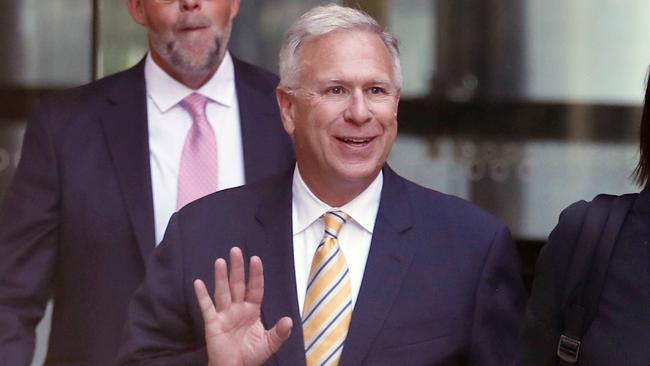Apple executive Phil Schiller tells of Steve Jobs’ dislike of note-taking
Steve Jobs told Apple executives not to take notes in meetings because they should be smart enough to remember the discussion, the Epic Games court case has been told.

Apple’s co-founder and former CEO Steve Jobs once told executives they shouldn’t take notes in meetings because they should be smart enough to remember what was being discussed, the Australian Federal Court has been told.
California-based Apple executive Phil Schiller shared the anecdote while giving evidence at a trial brought by Fortnite game developer Epic Games in Melbourne on Monday, after he was repeatedly questioned about why there was a lack of internal company documents that could explain how the tech giant decided to allow third parties to develop applications for Apple or how it landed on a 30 per cent commission rate for the sale of digital goods and services.
“When Jobs came back in 1997 he set this process up … in one of the earliest meetings. Someone was taking notes. He stopped and said ‘why are you writing this down, you should be smart enough to remember this’,” Mr Schiller said.
Mr Schiller, who is the global head of the App Store, said most executives stopped taking notes after that meeting and started “listening”.
He told the court he reported to Jobs from 1997 to 2011. Jobs died in 2011. Mr Schiller now reports to current CEO Tim Cook.
Epic is suing Apple and Google, and has alleged the companies abused their market power by effectively forcing developers to hand over a 30 per cent commission on in-app transactions because it will not allow them to use alternative payment methods.

Jobs was initially opposed to allowing third parties to develop apps for iPhone and iPad amid significant concerns about security, but ultimately changed his mind in about October 2007.
Mr Schiller repeatedly denied – under cross examination from Epic’s barrister, Neil Young KC – that one of the main goals of the App Store was to boost Apple’s profits.
“We knew we were going to generate revenue … (but) we didn’t set it up as one of two goals we articulated,” he said.
“I’m not trying to be difficult.”
The decision to fix a 30 per cent commission rate was decided by Jobs, Mr Schiller and another executive – Eddy Cue. But again said there was no record of the decision in notes, minutes or business cases.
The court also saw an email Mr Schiller sent to Jobs in July 2011 in which he asked if they thought the “70/30 split would last forever”. “I think some day we will have enough challenge from another platform … to adjust our model,” Mr Schiller said.
He was asked if after the App Store made $1bn a year, would that be enough to “ratchet” down the commission rate, but told Mr Young it was an “exchange between friends” and that he was being “facetious”. As well, Mr Young asked why app developers that sell physical goods via the App Store could use their own payment system and avoid the need to pay Apple’s 30 per cent commission, but not in the case of selling digital goods.
Mr Schiller said Apple could not ensure the quality of the “end-to-end” transaction with physical goods, but that it could with digital services.
The court was told Jobs was a “key decision maker” in the design and development of Apple’s iOS App Store in 2008.
Asked about the how the decision was made to introduce software developer kits so third-party app developers could create iPhone and iPad apps, Mr Schiller said he did not recall that he viewed a risk and benefit analysis or a financial analysis.
He said he did not realise that decision was a “major” one until after the fact, and said he and Jobs decided to open the App Store to third-party developers.
Mr Schiller said directors did not typically receive reports or documents for consideration.
The case continues.







